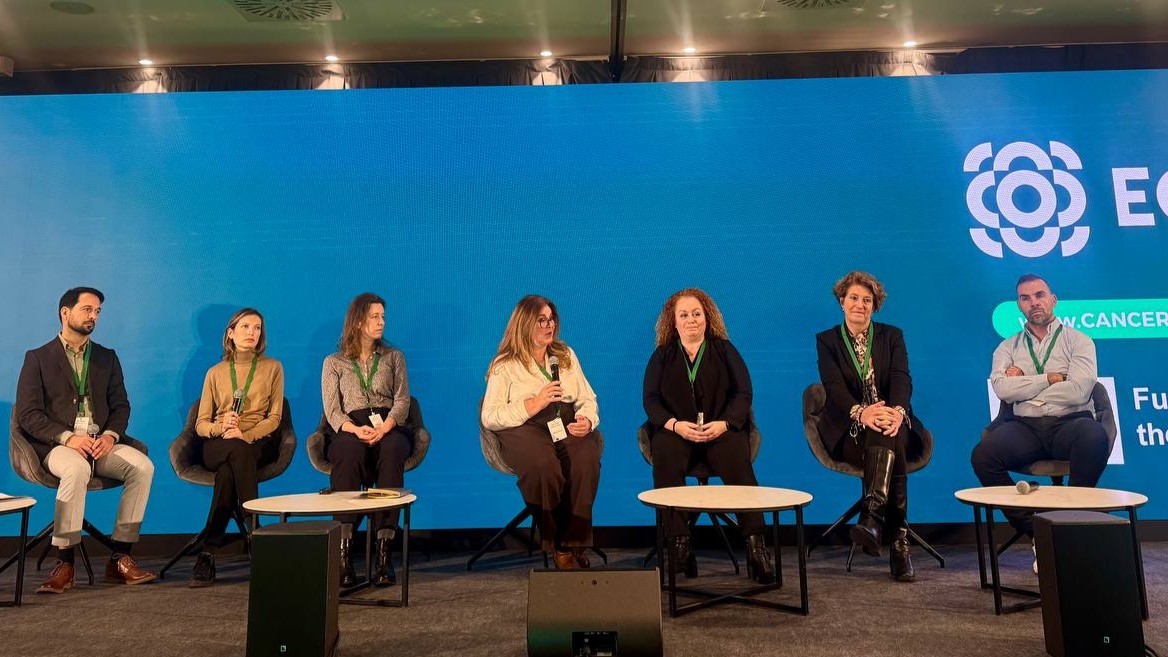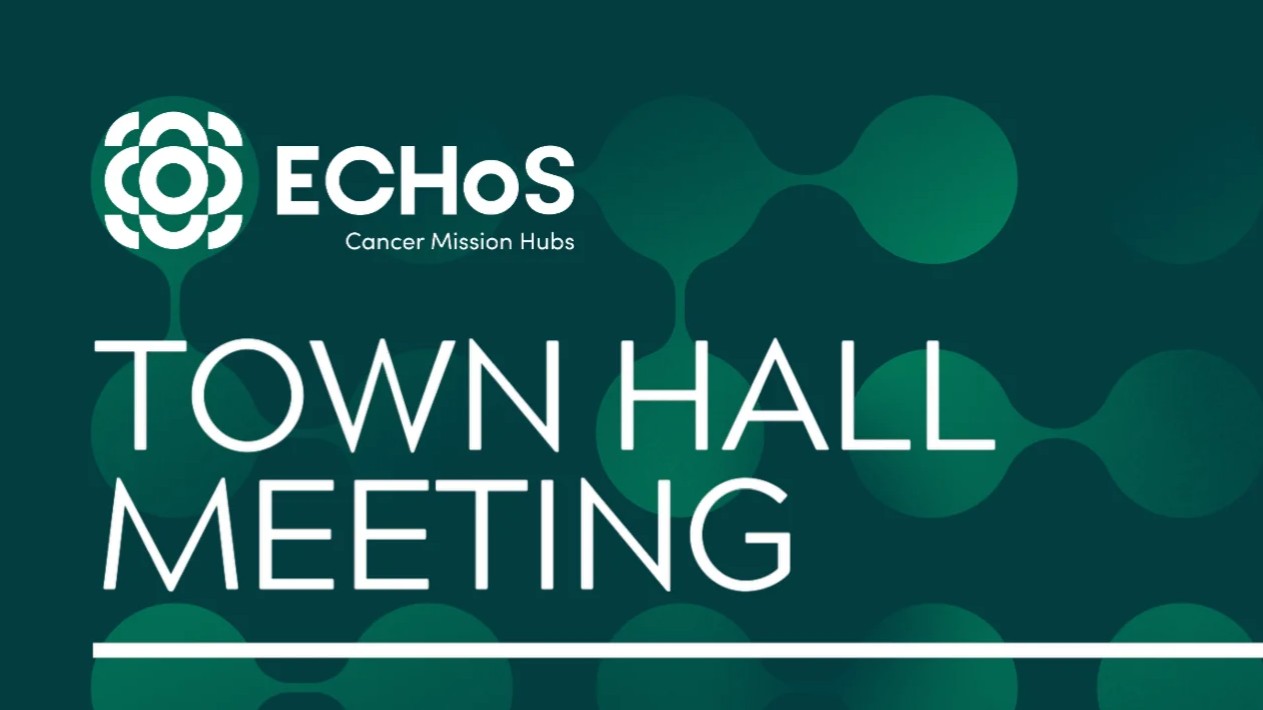This ECHoS Town Hall Meeting 2025 session brought together national representatives from Malta, Sweden, Greece, Poland, and Italy, each offering insights into how their countries are shaping and operationalising their National Cancer Mission Hubs (NCMHs). Despite different starting points, all emphasised collaboration, patient focus, and practical implementation of the EU Mission on Cancer.
Malta: Rapid and High-Impact Development
Speaker: Ian Gauci Borda, Xjenza Malta
Ian Gauci Borda highlighted Malta’s remarkable momentum in developing its NCMH, supported by strong political commitment and consistent ECHoS guidance. He noted that they have registered a significant progress thanks to the ability to unite previously fragmented parts of the system.
Key advances include:
- Rising annual government funding (€1.2M → €1.8M)
- The national Cancer Research Programme, now funding 10 projects
- Becoming the National Cancer Data Node under the CANDEL project
- Grants for early-career researchers and international publications
- A mobile cancer awareness and blood-testing van
- Winning the MedTech Non-Profit Organisation of the Year Award
- Malta’s model brings together ministries, academia, hospitals, NGOs, patients, and industry around one coordinated structure
Sweden: Building a Sustainable National Structure
Speaker: Mef Nilbert, National Board of Health and Welfare
Professor Mef Nilbert presented Sweden’s work to create a long-term, sustainable hub following a 2024 government mandate. Sweden’s challenge lies in its highly decentralised system of 21 autonomous regions.
The hub aims to:
- Unite national actors
- Create a knowledge platform
- Provide an arena to “dare to test” innovative approaches
- Build on learnings from Zero Vision Cancer
- Nilbert stressed the need to reach all regions, including sparsely populated northern areas, to reduce inequalities and engage all stakeholders in mission-driven innovation
Greece: ELLOK (Hellenic Cancer Federation)
Speakers:
- Sofia Xesfingi, University of Athens
- Marina Ximeri, Hellenic Cancer Federation (ELLOK)
From Fragmentation to Launch – Sofia Xesfingi
Sofia Xesfingi described how Greece moved from “among the countries with no structure” to becoming the second hub launched within ECHoS. Key challenges included institutional fragmentation and securing ministry support. ELLOK, representing more than 50 cancer patient organisations, was identified as the natural coordinating body.
Building a Multi-Stakeholder Hub – Marina Ximeri
Marina Ximeri outlined ELLOK’s hub structure, including:
- A multi-stakeholder advisory board
- Working groups in prevention, early diagnosis, survivorship, innovation access, digital health, and equity
- MyData EHDS workshops and national lung cancer policy dialogues
- Strong national collaborations with a variety of stakeholders and international partnerships with UICC, ECO, All.Can, and ECL amongst others enable ELLLOK to achieve more on behalf of patients and citizens and, at the end of the day, ELLOK as Greece’s NCMH acts as a bridge between European innovation and national implementation, so that every Greek patient can benefit from the EU’s Beating Cancer Plan and the Mission on Cancer
- Recognition as a NCMH brings tangible benefits. Each NCMH could contribute to policy agendas, co-create recommendations and serve perhaps as a recognised intermediator for national alignment with EU cancer policies
Poland: Building Community Through Dialogue
Speaker: Agnieszka Janowska, National Institute of Oncology
Agnieszka Janowska reported on Poland’s rapid post-launch activities, including five full-day workshops with different stakeholder groups (industry, patients, researchers, clinicians, policymakers). Using design-thinking, they explored patient cases and identified priority themes: prevention, precision medicine, digital medicine, survivorship, palliative care, cross-border care, and communication/education.
She emphasised that “the in-person meeting… to express themselves… to integrate” was crucial for trust and mutual understanding. Poland will convene an All-Stakeholders Assembly on 8 December to establish thematic working groups and initiate implementation.
Italy – Alliance Against Cancer (ACC)
Speaker: Lidia Villanova, Alliance Against Cancer
Italy’s presentation highlighted one of the most mature national ecosystems. Alliance Against Cancer (ACC), the national network for translational cancer research, brings together 33 member institutes, including 27 research hospitals and 11 OECI-designated Comprehensive Cancer Centres.
Villanova showcased major achievements including:
- Ministerial endorsement of ACC’s NCMH application
- Diversified funding (membership fees, competitive grants, partner funding, structural ministerial support)
- ACC’s pivotal role in securing reimbursement of repurposed drugs
- The development of a national digital platform for Regional Molecular Tumor Boards, enabling secure data processing and interoperability
- ACC positions itself as a “catalyst of change” across Italy’s 21 regional health systems, helping harmonise digitalisation and oncology care pathways
Cross-Country Insights
Across all presentations, common themes emerged:
- Collaboration is the foundation of progress
- Fragmentation remains a universal challenge but can be addressed through structured hubs
- Patient organisations are central actors in several countries (especially Greece and Italy)
- Digital readiness and data interoperability are shared priorities
- Sustainability through secure funding and structured governance is essential
- Countries are moving from planning to implementation, the central message of the Mission
You Can Also Read: Opening of the ECHoS Town Hall Meeting 2025
Written by Lena Mkrtchyan, MD.



